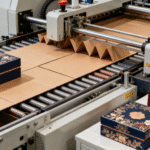Linkage Between Packaging Equipment and WMS: Technical Paths and Benefit Improvement for “On-Demand Packaging”
Alyssa/October 2,2025 Return

API Integration: By developing standardized APIs (Application Programming Interfaces), WMS can automatically send order details (e.g., product dimensions, weight, quantity, and protection requirements) to packaging equipment controllers. For example, DHL’s European warehouses use REST APIs to transmit data, ensuring that folding carton machines receive box size parameters (e.g., 20cm×15cm×10cm for small electronics) within 0.5 seconds of an order being confirmed.
IoT Sensor Feedback: Packaging equipment equipped with IoT sensors (e.g., laser dimension scanners, weight sensors) sends real-time operation data (e.g., actual box size, material usage) back to WMS. This forms a closed-loop system—if the equipment detects a mismatch (e.g., a box smaller than the required size), WMS immediately alerts operators, reducing error rates by over 90% (per a 2024 report by the International Warehouse Logistics Association).
Automatic Parameter Adjustment: For flexible packaging machines (e.g., stretch film wrappers), WMS sends tension and film length parameters based on product weight. A U.S. e-commerce giant’s warehouse saw stretch film usage drop by 18% after their wrappers started adjusting tension (from 5N to 3N for light products) automatically via WMS instructions.
Dynamic Box Selection: WMS analyzes product dimensions and recommends the optimal box size from the inventory. Advanced systems like Amazon’s “Packaging by Amazon (PbA)” even direct automatic box erectors to fold custom-sized boxes on demand. This eliminates the need for manual box sorting, cutting packaging time per order from 2 minutes to 45 seconds.
Cost Reduction: On-demand packaging cuts material waste by 25-35%. A German automotive parts supplier reduced carton waste from 15% to 4% after linkage, saving $120,000 annually on packaging materials. Labor costs also drop—fewer operators are needed for data input and error correction.
Improved Customer Satisfaction: Accurate packaging reduces product damage during transit. FedEx’s Asia-Pacific division reported a 40% decrease in damage claims after implementing linkage, as WMS ensures fragile items (e.g., glassware) receive extra cushioning via equipment instructions.
Sustainability Gains: By minimizing excess packaging, enterprises reduce carbon footprints. Walmart’s U.S. warehouses, for instance, lowered plastic usage by 22% in one year through WMS-directed on-demand packaging, aligning with global eco-friendly goals.
Newsletter Updates
Enter your email address below and subscribe to our newsletter



